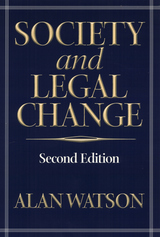
This wide-ranging book is a comparative study of the civil law, primarily the legal systems of western continental Europe and Latin America. It attempts to account for the distinctive features of civil law systems and hence to contribute to an understanding of the forces that cause law to change. The author contends that the basic differences between civil-law and common-law systems derive from legal history rather than from social, economic, or political developments. Above all, he argues, it was the acceptance of the authority of Justinian's Corpus Juris Civilis that determined the future nature of civil-law systems and gave them their distinctive character.
Mr. Watson outlines the features of Roman law as codified by Justinian that made it adaptable in countries with widely differing political systems, social structures, and local court practices. His learned and lucid exposition encompasses the role and influence of professors of Roman law in medieval universities; the manner and extent to which the case law of various countries drew upon the Corpus Juris; the role of the Institutes as a model for the institutes of local law which were the immediate ancestors of most of the national codes; and the effect of the Corpus Juris on basic features of the civil law, such as the fundamental division between public and private law, with different courts for the two, and the separation of commercial law from the rest of private law.
Scholars may debate his thesis, but none will dispute Alan Watson's command of the sources and his mastery of legal material spanning many centuries and countries. His book will present a challenge to legal historians and students of comparative law, and it will provide Anglo-American lawyers with insight into the nature of civil-law systems.

In this first U.S. edition of a classic work of comparative legal scholarship, Alan Watson argues that law fails to keep step with social change, even when that change is massive. To illustrate the ways in which law is dysfunctional, he draws on the two most innovative western systems, of Rome and England, to show that harmful rules continue for centuries. To make his case, he uses examples where, in the main, "the law benefits no recognizable group or class within the society (except possibly lawyers who benefit from confusion) and is generally inconvenient or positively harmful to society as a whole or to large or powerful groups within the society."
Widely respected for his "fearless challenge of the accepted or dominant view and his own encyclopedic knowledge of Roman law" (The Encyclopedia of Historians and Historical Writing), Watson considers the development of law in global terms and across the centuries. His arguments centering on how societies borrow from other legal systems and the continuity of legal systems are particularly instructive for those interested in legal development and the development of a common law for the European Union.
postamble();READERS
Browse our collection.
PUBLISHERS
See BiblioVault's publisher services.
STUDENT SERVICES
Files for college accessibility offices.
UChicago Accessibility Resources
home | accessibility | search | about | contact us
BiblioVault ® 2001 - 2024
The University of Chicago Press









